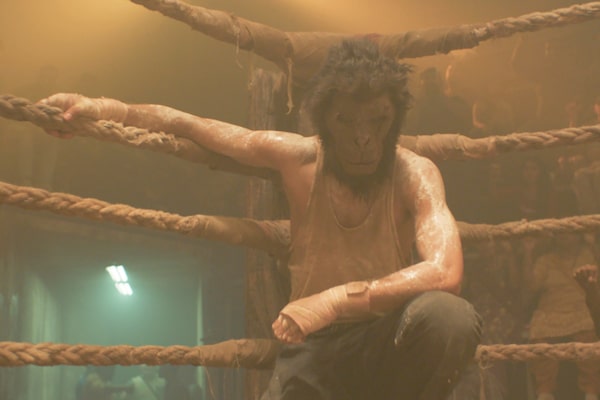- Monkey Man
- Directed by Dev Patel
- Written by Dev Patel
- Starring Dev Patel, Sharlto Copley, Pitobash
- Classification R; 121 minutes
- Opens in theatres April 5
The myth of the infant Hanuman – the Hindu monkey-god of physical strength, devotion, courage and self-discipline – asserts that the deity mistook the sun rising in the sky for a giant, glistening mango. He flew up to consume it whole, which angered the god of the skies, who struck him back to Earth and wounded his jaw. This lore opens Monkey Man, the directorial debut of actor Dev Patel, with a doting mother relaying the story to her young son before bed, setting into motion the quasi-Icarus complex which drives this pulpy revenge thriller.
Illustrations of Hanuman cut to a subterranean fight club in the fictional Indian city of Yatana, where a man in a monkey mask is being clobbered to the sounds of delighted cheers. Kid (Patel), the mysterious man being pummelled, is chastised by the club manager for appearing weak and detestable to the crowd. It quickly becomes clear that he’s squirrelling away money for an illicit scheme when he buys a handgun and organizes the pickpocketing of a prominent nightclub manager, whom he convinces to hire him upon the seemingly gracious return of her wallet: “Give me the job no one wants to do and I’ll do it,” he says. Working at the club, Kid is able to infiltrate the city’s elite, and access an abridged record of India’s lower castes.
Through flashbacks, Kid’s political motivations become clear: Kid’s mother was murdered by police and his community forcibly displaced from their ancestral land to make room for a commune governed by Baba Shakti (Makarand Deshpande), a narcissistic pseudo-guru whose rags-to-riches lifestyle has seduced Yatana’s public.
At the same time, a nationalist political campaign known as the “Sovereign Party” is gearing up for an election, with Shakti’s sponsorship and the police in their pocket; they incite violence against non-believers and promise to reckon with the apparent “problem” of transgender people in the city. (The film’s protest footage comes from real demonstrations in India.) Kid manages to suss out the city’s sinister beau monde while still donning the monkey mask and fighting at night, and his hit list seems to grow with every scene.
In 2018, Monkey Man (described as “John Wick in Mumbai”) was announced as Patel’s directorial debut, which he would co-write, produce and star in. The ensuing years proved difficult for the project: filming in India was significantly postponed in the wake of COVID-19 lockdowns; they pivoted to Batam, Indonesia, with minimal crew, where Patel broke his hand during a stunt sequence and was unable to seek medical treatment; the production designer and cinematographer departed the film and composer Volker Bertelmann was replaced; Patel called it “a gruelling nine months of absolute joy and utter chaos.”

Monkey Man is actor Dev Patel’s directorial debut.Universal Pictures/The Associated Press
Upon seeing Monkey Man, Jordan Peele (Get Out, Nope) acquired it from Netflix and brought it to Universal under his Monkeypaw Productions banner to secure a theatrical release. On paper, the film is solid and blockbuster-audience friendly: a fleshy action film with an onscreen kill count in the hundreds. However, the film’s woozy overediting – countless match cuts, hand-held close-ups, an often obfuscated lens – makes the theatrical experience tiring.
In an interview with Deadline, Patel said he wanted to give the film “real soul, real trauma, real pain” and “infuse it with a little bit of culture.” Monkey Man does tow an impressive line between Bollywood and Hollywood aesthetics, with clear cinematic influences, rickshaw chases, and a symbiotic reading of caste, strata, idealism and corruption in the East versus the West – in particular, their mutual subjugation of transgender and gender-nonconforming bodies. The stronger sequences occur when Kid is healing from his injuries in a temple of exiled hijra, a third-gender tribe with strong spiritual powers, who offer him the maternal care he desperately needs during his vengeance mission.
After the theatrical trailer was released, there was speculation online about the changing of the Sovereign Party’s colour from saffron to scarlet, and whether this was the result of pressure from India’s highly conservative Bharatiya Janata Party, who use the same orange hue. This is the case in one sequence, while the party colours appear their original orange in the background of multiple other scenes.
Though the shift in palette does not immediately translate to a Red Scare, Monkey Man certainly feels as though it’s been stripped of the campaign’s wider context; Shakti and the chief of police become the loathsome pundits, but the directly political figures vanish from sight, with the Sovereign candidate being one of the only characters who evades a gruesome death.
Patel is not reinventing the wheel here, nor is he establishing a coherent visual language to build upon in future films, but Monkey Man is cleverly castigating and proud of its lineage – a digestible bit of mythmaking with knife work to boot. Veni, vidi, vici; money, monkey, mommy.
In the interest of consistency across all critics’ reviews, The Globe has eliminated its star-rating system in film and theatre to align with coverage of music, books, visual arts and dance. Instead, works of excellence will be noted with a critic’s pick designation across all coverage. (Television reviews, typically based on an incomplete season, are exempt.)